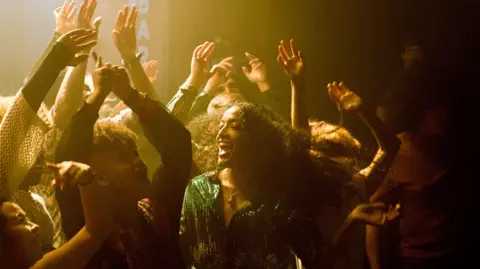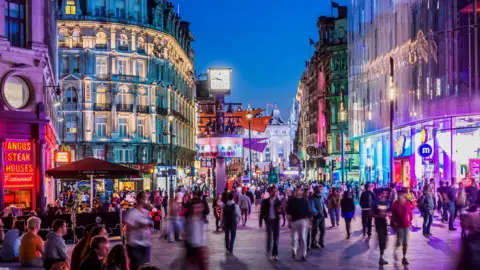Could Thursday be 'the new Friday' for Londoners?
 Getty Images
Getty ImagesA focus on week nights, innovative markets and street food vendors could help London's night time economy, a City Hall report has said.
As London's new Nightlife Taskforce begins work, a committee of London Assembly members has made recommendations in a report that it said would be "useful in driving forward our city's success".
Members heard that Thursday was now a "really important night" in terms of footfall and consumer spending, but the "jury was still out" on whether Thursday was "the new Friday".
A spokesperson for Sir Sadiq Khan said the London mayor would consider the Assembly's report and respond in due course.
"London's nightlife industries, as with other cities across the country, have faced a huge range of challenges in recent years," the spokesperson said.
"The rising cost-of-living and operational costs, shifts in consumer behaviour, staffing shortages and licensing issues have all been hitting businesses hard.
"The mayor will continue to do all he can to support London's nightlife."
 Getty Images
Getty ImagesThe London Assembly's Economy, Culture and Skills Committee said there was "some evidence to suggest that venues with an offering that is less centred around alcohol consumption have fared better than their competitors which focus primarily on drinking".
Night markets and street food venues had fared better than their competitors which focus primarily on drinking, while food-led pubs had shown more resilience compared traditional high-street pubs, the committee's report said.
Although Thursdays were found to be "important", evidence heard by the committee indicated that levels of footfall and spending on Thursdays were still significantly lower than levels seen on Fridays before the pandemic.
There had also been a sharp drop in mid-week trade in London, coinciding with the rise of flexible working and fewer people socialising in the city after work.
The committee found the Night Time Enterprise Zones programme, which operated in Bromley, Vauxhall and Woolwich between 2022 and 2023, had been successful, with overall local spending was boosted by up to 70% in those areas between 18:00 and 21:00.
However, London's night-time activity was heavily concentrated in central London, with the West End being by far the most popular destination in London, as well as in the UK as a whole, the report said.
The area sees more than 140,000 visitors on a typical Thursday to Saturday night, more than four times as many as the second-busiest destination, Covent Garden.
 PA Media
PA MediaThe committee also heard evidence both for and against the controversial night czar.
The mayor appointed Amy Lamé as London's night czar in 2016, as part of his "vision for London as a leading 24 hour city".
Sir Sadiq and Ms Lamé, whose salary rose to £132,846, both faced questions about her record in boosting London's nightlife.
When she stood down in October 2024 the mayor's office credited her with having "supported hundreds of venues since 2016".
Michael Kill, chief executive of the Night Time Industries Association, told the committee that unlike cities such as Manchester and Bristol, London lacked a coordinated approach and a "clear narrative" to unite key stakeholders like TfL, the mayor's office, and businesses.
The committee said organisations including the Music Venue Trust argued that the night czar's role should be expanded and given new powers and a larger budget.
However, the committee said it was clear from the evidence received that many individuals and organisations did not feel London at night was as vibrant or successful as it could be since the pandemic.
The mayor launched the London Nightlife Taskforce earlier this month which is made up of key stakeholders from the sector.
So far no-one has been appointed to replace Ms Lamé as the night czar.
Listen to the best of BBC Radio London on Sounds and follow BBC London on Facebook, X and Instagram. Send your story ideas to [email protected]
